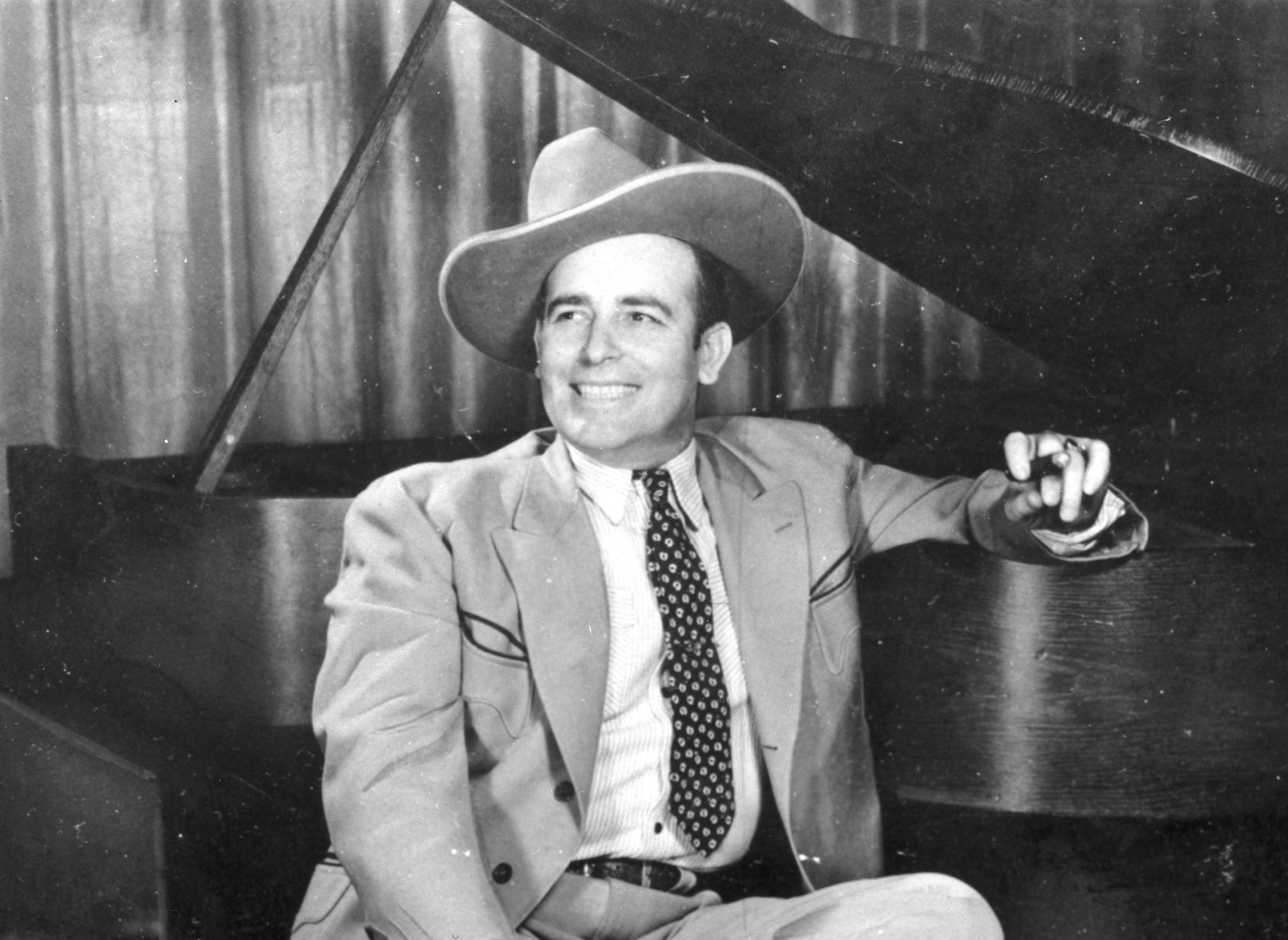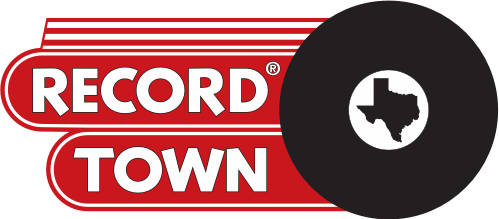Happy Birthday to Bob Wills, You Are Still the King

"But when you cross that ol' Red River, hoss, That just don't mean a thing. Once you're down in Texas, Bob Wills is still the King". Waylon Jennings said it all.
Bob Wills helped create Western Swing, good time music that combined blues, jazz, hillbilly and a few other sounds to keep you on the dance floor. Record Town is proud to honor Bob Wills, The King of Western Swing on his birthday, March 6.
Mickey Rausch, son of famed Texas Playboy vocalist Leon Rausch is a great friend of Record Town and incredible musician in his own right. We are proud to be friends with Mickey. Mickey is allowing Record Town to sell some of his Dad's LPs, some are even signed by Leon and other great musicians!
Extra special thanks to Mike Markwardt of Cowtown, Birthplace of Western Swing for allowing Record Town to repost the following information from The Birthplace of Western Swing website. The Birthplace of Western Swing Festival happens every November at the National Hall in Fort Worth and features top-notch Western Swing players. Don't miss it!
James Robert "Jim Rob" (Bob) Wills (March 6, 1905 - May 13, 1975) was born the first of 10 children to Emma Lee Foley and John Tompkins Wills in the small central Texas farming community of Kosse. His father was a fiddle player who along with his grandfather, taught the young Wills to play the fiddle and the mandolin. The family soon moved to Hall County in the West Texas Panhandle in 1913, where young Bob began picking cotton "down between the rivers" (Little Red River and Prairie Dog Town Fork), halfway between Lakeview and Turkey, Texas. He enjoyed listening to the black cotton pickers singing the blues as they moved up and down the cotton rows. Wills once told Charles Townsend, author of San Antonio Rose: The Life and Times of Bob Wills, "They sang blues you never heard before".
At the young age of 10 Wills played his very first ranch dance. He played for countless West Texas house parties and ranch dances over the next 14 years, where his life and career were greatly influenced by that frontier fiddle environment. He also importantly learned the blues and jazz from his black playmates and coworkers who sang and picked blues on their guitar. He learned to play fiddle and sing with the heat of blues and the swing of jazz; his fusion of music could as properly have been called Western Jazz as Western Swing.
After several years of drifting, "Jim Rob", then in his 20s, attended barber school, got married, and moved first to Roy, New Mexico then back to Turkey, Texas to be a barber. He alternated barbering and fiddling even after he settled in Fort Worth, Texas in 1929 to pursue a career in music. It was there that while performing blackface in a medicine show, he learned comic timing and some of the famous "patter" he later delivered on his records. The minstrel show's owner gave him the nickname "Bob".
The irony that Wills made his professional debut in blackface is not lost on Wills' daughter, Rosetta. "He had a lot of respect for the musicians and music of his black friends", Rosetta is quoted as saying on the Bob Wills and the Texas Playboys Web site. She remembers that her father was such a fan of Bessie Smith, "he once rode 50 miles on horseback just to see her perform live".

1930's Poster From Burrus Mill in Forth Worth, Texas makers of Light Crust Flour and radio sponsors of Bob Wills and The Light Crust Doughboys (On the Walls at Record Town)
In Fort Worth, Wills soon met Herman Arnspiger and formed the Wills Fiddle Band. In 1930 Wills and Arnspiger met Milton Brown while playing at a small house party and were quite impressed with Brown's talented blues & swing style of singing, and immediately invited him to join the group as lead vocalist. Brown brought a sense of innovation, experimentation, and versatility to the soon to be named Light Crust Doughboys due to a radio sponsorship by the makers of Light Crust Flour. Brown's little brother played rhythm guitar and soon joined the band together with banjoist Clifton "Sleepy" Johnson.
Brown and his little brother eventually left the band in 1932 to form the Musical Brownies, the first true Western Swing band. Brown added twin fiddles, tenor banjo, standup slap bass, jazz piano and the first ever amplified steel guitar, pointing the music in the direction of swing, which they played to great success on local Fort Worth radio and also at the birthplace of Western Swing - Crystal Springs Dance Pavilion, as well as numerous other dance halls throughout Texas and Oklahoma.
Wills remained with the Doughboys and replaced Brown with new singer Tommy Duncan in 1932. He found himself unable to get along with future Texas Governor W. "Pappy" Lee O'Daniel, the authoritarian host of the Light Crust Doughboy radio show. O'Daniel had parlayed the show's popularity into growing power within Light Crust Flour's parent company, Burrus Mill and Elevator Company and wound up as General Manager, though he despised what he considered "hillbilly music". Wills and Duncan left the Doughboys in 1933 after Wills had missed one show too many due to his sporadic drinking.
Wills recalled the early days of what became known as Western Swing music, in a 1949 interview. "Here's the way I figure it. We sure wasn't tryin' to take credit for swingin' it". Speaking of Milton Brown and himself working with songs done by Jimmie Davis, the Skillet Lickers, Jimmie Rodgers, and others, and songs he'd learned from his father, he said that "It all started with me and Milton at Fort Worth's Crystal Springs Dance Hall. We'd pull these tunes down an set 'em in a dance category. It wouldn't be a runaway, we'd just lay them in a real nice groove beat, and the people would begin to really like it. It was nobody intended to start anything in the world. We was just tryin' to find enough tunes to keep 'em dancin' and not have to repeat so much".
After leaving the Doughboys, Wills along with a nucleus of his former band, started "Bob Wills & His Playboys", relocating to Waco, Texas. They found enough popularity there to decide on a bigger market. They left Waco in January of 1934 for Oklahoma City. Wills soon settled the renamed "Texas Playboys" in Tulsa, Oklahoma, and began broadcasting noontime shows over the 50,000-watt KVOO radio station. Their 12:30-1:15pm Mon-Fri broadcasts became a veritable institution in the region. Nearly all of the daily shows originated from the stage of Cain's Ballroom. In addition, they played dances in the evenings, including regular ones at the ballroom on Thursdays and Saturdays. By 1935 Wills had added horn, reed players and drums to the Playboys. The addition of steel guitar whiz Leon McAuliffe in March 1935 added not only a formidable instrumentalist but a second engaging vocalist. Wills himself largely sang blues and sentimental ballads.
With its jazz sophistication, pop music and blues influence, plus improvised scats, and wisecrack commentary by Wills (something he learned clowning in those earlier medicine shows), the band became the first superstars of the genre. Milton Brown's tragic and untimely death in 1936 had cleared the way for the Texas Playboys.

Poster From Mid-1930's of Bob Wills and His Texas Playboys (On the Walls at Record Town)
Wills' 1938 recording of "Ida Red" served as a huge inspiration for Chuck Berry's similar sounding song decades later - Maybellene. In 1940 "New San Antonio Rose" sold over 1 million records and became the signature song of The Texas Playboys. The song's title referred to the fact that Wills had recorded it as a fiddle instrumental in 1938 as "San Antonio Rose". By then, the Texas Playboys were virtually two bands: one a fiddle-guitar-steel band with rhythm section and the second a first-rate big band able to play the day's popular swing and pop hits as well as Dixieland.
In 1940 Wills, along with the Texas Playboys, co-starred with Tex Ritter in "Take Me Back to Oklahoma". Other films would follow. In late 1942 after several band members had left the group, and as World War II raged , Wills joined the Army, but received a medical discharge in 1943.
Wills' musical legacy has endured, bridging the gap from the race music of the 1930s and 40s to be-bop, rockabilly, and rock & roll. His style of music and innovation influenced performers as vast as Hank Williams, Chuck Berry, and Jimi Hendrix. He heavily influenced Buck Owens and Merle Haggard and helped to spawn a style of music now known as the Bakersfield Sound (Bakersfield, California was one of Wills' regular stops in his heyday). A 1970 Bob Wills tribute album by Haggard directed a wider audience to Wills' music, as did the appearance of younger "revival" bands like Asleep at The Wheel and the growing popularity of longtime Wills disciple and fan Willie Nelson. Before his own death, Waylon Jennings recorded a hit song that paid tribute to his hero: "Bob Wills is Still the King". Today, George Strait performs Bob Wills music live on tours and also records songs greatly reflecting the magic of Bob Wills and his Texas style Western Swing.
The King of Western Swing was inducted into the Country Music Hall of Fame in 1968 and also the Nashville Songwriters Hall of Fame in 1970. He has continued to receive accolades after his death with "New San Antonio Rose" being honored with a Grammy Hall of Fame Award in 1998. On March 15, 1999, at Manhattan's Waldorf-Astoria Hotel, Bob Wills was inducted into the Rock and Roll Hall of Fame under the category "Early Influence". His plaque is near those he influenced and those who loved his music - Bill Haley, Chuck Berry, Elvis Presley, Buddy Holly, Paul McCartney, Eric Clapton, and others. He is one of only a handful of people to be inducted into both the Country Music Hall of Fame and Rock & Roll Hall of Fame.

Rare Postcard of Bob Wills and His Texas Playboys at Panther Hall in Fort Worth, Texas in early 1970's
Bob Wills Music Available at Record Town










